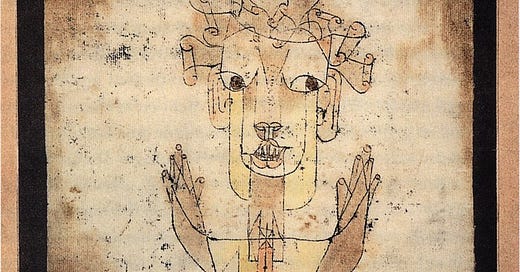Cantilever is a regular rundown of upcoming London-based gigs and other musical ephemera. Subscribe to receive these updates directly in your inbox!
This week’s playlist
@ - ICA 21.06.2025 / Moth Club 14.08.2025
The band with the worst Search Engine Optimisation since !!!, recent 4AD signees @’s nominative obscurity may or may not account for their increasing word of mouth popularity. At the very least though, the name is suggestive of a very online aesthetic. Today, when we type an @, we’re usually ‘tagging’ someone. We’re saying: this is for you, you’re in this. Who are @ tagging?
To my mind, on @’s debut album Mind Palace Music, they’re tagging the American indie-pop-folk music of almost exactly 20 years ago. Listening to the acoustic guitar playing, harmony and vocalisation on tracks like ‘Parapet’ or ‘Friendship is Frequency’, it is difficult not to think about Animal Collective’s 2004 album Sung Tongs and their collaborative EP with Vashti Bunyan, Prospect Hummer (2005), while the understated pop songwriting recalls Grizzly Bear’s intimate Horn of Plenty (2004). I also hear Dirty Projectors and a hint of Lucky Dragons. This lineage leaves me questioning: if this is “hyperfolk”, as the artists themselves describe it, what, if anything, is “hyper” — from the Greek huper, meaning over or beyond — about it?
Write-ups of @ all reference the fact that Mind Palace Music was composed through iMessage: with snippets of songs sent back and forth and composed remotely by its two members, living in different cities. A compelling post-internet mode. Although the remote collaboration angle once again goes back at least 20 years: pop band The Postal Service derived their name from their method of composition, sending stems back and forth in the mail. Slower than iMessage, sure, but not so different in spirit.
Moreover, when it comes to @, I don’t hear any digital disjunction at all in the music; their folk-pop songs are coherent and fully-realised. Mentioning the iMessage history at all is, in my view, a way of distancing the project from its immediate sound-alikes: it’s saying “It’s not what you think.” This isn’t just 00s-indie-folk revival, but something of now. If this is true, in what way is it true?
In @, I think we hear a subtle inversion of what Mark Fisher called The Slow Cancellation of the Future. For Fisher, we have “an excessive tolerance of the archaic.” “Anything can come back” in our consistently retro-obsessed culture industry. It’s not just that artists simply look to the past for inspiration - retro-ism has been present from the beginning of popular music - but that in the 2000s, so Fisher claimed, we were given nothing but retro-ism, there was of now to compare the retro to.
It was, ironically, exactly the period of 20 years ago, at which Fisher levied a kind of musical End of History: “What is the sound of 2005?”, “What is the sound of 2008?” he asked in a lecture, implying that — of course! — there wasn’t one.
Although, clearly, there was.
In fact, there were many — too many perhaps…
This very multiplicity was part of the problem for Fisher; the contemporary artist not only has their immediate peers to take inspiration from, but also the readily accessible archive of global recorded music history. “What the internet provides is an oppressive weight of the past”, he said.
But what if, instead of an “oppressive weight”, artists take the ability to instantly and seamlessly interact with the “past” as a creative potential; what if it is in fact liberating?
This charge of future potential, found in the past, is exactly what Animal Collective themselves were channeling when collaborating with Vashti Bunyan on Prospect Hummer — her only previous album, Just Another Diamond Day, having been released in 1970. Or when making the later Merriweather Post Pavilion (2009) and Fall Be Kind (2009), records so clearly brilliant that to express admiration towards them has become its own cliché. This was not a “revival” but something very different: with ‘My Girls’s interpolation of Frankie Knuckles, and ‘What Would I Want, Sky?’, using the first ever licensed Grateful Dead sample as its basis, Animal Collective convened with multiple sounds and genres from the past to make completely future-sounding music.
Merriweather Post Pavilion was not ‘futuristic’ — a term often used in an ironically regressive way, an image of the future stuck in the 1980s — but was something that truly sounded of the future. Something that, when I was a teenager, genuinely blew me away with its riveting newness: the exact experience that Fisher tells us no one was having in 2009.
Accordingly, an experience of stunning newness is exactly what listeners are finding when listening to Mind Palace Music. So how can it feel both new and revivalist simultaneously?
What is compelling about revivals — or to be more accurate to what @ are doing, convening with an older sound and taking it somewhere new — is that the thing being revived had to, at one stage, be considered irrelevant: in the eyes of the incredibly fickle culture industry’s demand for novelty, it had to be considered trash, fallen by the wayside. To jump straight from one overly referenced leftist thinker to another then, for Walter Benjamin, the very essence of the “poetic mind”, was to be found in the appreciation of that which the mainstream culture considered trash, which he summarised in the image of the rag picker:
“Here we have a man whose job it is to gather the day’s refuse in the capital. Everything that the big city has thrown away, everything it has lost, everything it has scorned, everything it has crushed underfoot he catalogues and collects. […] refuse which will assume the shape of useful or gratifying objects between the jaws of the goddess of Industry.”
The rag picker cares not that the city has discarded its trash, seeing instead the residual value in the trash that others had forgotten or neglected. This value is necessarily future-oriented: it “will assume” a new shape.
"History must have a dustbin, or history will be a dustbin, a gigantic, sprawling garbage heap", Simon Reynolds said in Retromania: Pop Culture's Addiction to Its Own Past (2010). But history always already was a dustbin. As Benjamin said in Theses on the Philosophy of History (1940):
This is how one pictures the angel of history. His face is turned toward the past. Where we perceive a chain of events, he sees one single catastrophe which keeps piling wreckage and hurls it in front of his feet. […] The storm irresistibly propels him into the future to which his back is turned, while the pile of debris before him grows skyward. This storm is what we call progress.
Only the person who can legibly sort through the “debris” can really tell us where we’re going next.
I hear Benjamin’s imagery obliquely paraphrased on @’s ‘First Journal’, where guitarist / vocalist Victoria Rose sings:
You are the junk in my screen
You are the junk in my dreams
And I never thought I’d leave you
And I never thought I’d need you.
In the “junk”, the thrown away culture of the extremely online world, ever amassing more and more material and mediated through the “screen”, there is still “dreaming” — still productive imaginative work — to be had. What we “leave” we may once again “need”.
@, like Animal Collective, come from a position where popular music — and perhaps culture more broadly — is not a series of fixed points in a linear progression, but more a constellation, from which new forms and new sounds can constantly arise, beyond or over their origins. This is what is hyper about it.
Mohammad Syfkhan - Oslo Hackney, 17.05.2025
Mohammad Syfkhan’s album I Am Kurdish (2024) combines traditional bouzouki playing with electronic drum machines to create a kind of ecstatic dance-oriented traditional music. It’s a full, compressed kind of sound, one where you can easily lose yourself in its mesmeric rhythms.
Some tracks have been crafted specifically with dancefloors in mind — ‘Do You Have a Lover or Not?’, ‘I Am Kurdish’, while others have a distinctly sombre feeling to them — ‘A Thousand and One Nights’, or ‘Wasted Years’. It’s fitting that this record — consisting mainly of new arrangements of popular songs from the Middle East and North Africa — should have sonic shades of light and dark, as its genesis is a story of both great tragedy and uplifting collaboration.
Mohammad Syfkhan is a Kurdish/Syrian Singer and Bouzouki player who began playing music in 1980 while he was in college studying nursing. When he got his degree in 1983, Mohammad moved to the city of Raqqa, Syria where he started his own band, The Al-Rabie Band, which played concerts, parties, weddings and festivals. Their live sets included Kurdish, Arabic, Turkish and some Western songs as well as Mohammad’s own original material.
When the war broke out in Syria, one of Syfkhan’s sons was tragically killed by Isis and the family were forced to leave their home and seek refuge in Europe, some emigrating to Germany while Syfkhan, his wife and young daughter settled in Ireland, splitting the family apart. Quoting the Nyahh Records write up for I Am Kurdish on BandCamp:
“Mohammad has spoken at length of his confusion and despair with fundamentalists and how their message is a far cry from the teachings of love and understanding that he considers the true message of Islam.”
A recently arrived refugee in County Leitrim, Ireland, Syfkhan connected with Nyahh Records label manager Willie Stewart, asking him if he could plug his bouzouki into Stewart’s mixing desk while the latter was DJ-ing a local event, celebrating the culture of new international communities in County Leitrim. Soon enough, Syfkhan was being booked for shows and connected with musicians in the Irish traditional and experimental scene, including landing a support slot with Lankum in County Cork.
This story of collaboration — how one culture can support the traditional music of another and assimilate it into its own traditional music culture — is a great example of how folk music is always on the move, it is never fixed nor finished.
Syfkhan continues two living traditions then, the vitality of Kurdish festival music that develops with his drum machine rhythms and playing, and Irish Traditional music, which now, given his place in Irish culture, finds a new sound that perfectly shares its values of collectivism and community.
“I thank everyone who has stood with me and supported me. And I especially thank the Irish people who have engaged with my music in such a wonderful way. I consider myself lucky to have come to this wonderful country that has welcomed me and all refugees. I thank God for everything, and now, thanks to this wonderful country, I am a musician and have a safe home. Thank you to the Irish government and people for giving me the honour of calling this country my home.” - Mohammad Syfkhan
Syfkhan plays Oslo Hackney on the 17th of May and a handful of UK festivals over the summer.
Nyahh Records, for their part, have a fascinating and eclectic approach to releasing music and recently put out a retrospective of the music of Roger Doyle, who has been catapulted from obscurity after Caroline Polachek covered his piece ‘Spring is Coming with a Strawberry in the Mouth’, a great write up of which by
can be read here:







I see that you are following me and I greatly appreciate it. I hope you’ll subscribe to the following.
https://makinghistorycomealive.substack.com/